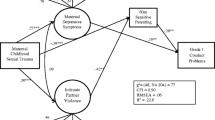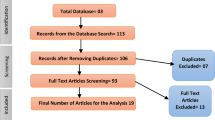Abstract
The current study examined exposure to multiple traumas as mediators of the relationship between childhood sexual abuse and negative adult mental health outcomes. Participants were 174 women interviewed in the third wave of a longitudinal study of the consequences of child sexual abuse. Child sexual abuse victims reported a lifetime history of more exposure to various traumas and higher levels of mental health symptoms. Exposure to traumas in both childhood and adulthood other than child sexual abuse mediated the relationship between child sexual abuse and psychological distress in adulthood. There were also some significant direct effects for child sexual abuse on some outcome measures. Results point to the importance of understanding the interconnected nature of trauma exposure for some survivors.
Similar content being viewed by others
References
Alexander, P. C. (1992). Application of attachment theory to the study of sexual abuse. Journal of Consulting and Clinical Psychology, 60, 185–195.
Arata, C. (1999). Repeated sexual victimization and mental disorders in women. Journal of Child Sexual Abuse, 7, 1–17.
Banyard, V. L., & Williams, L. M. (1996). Characteristics of child sexual abuse as correlates ofwomen's adjustment: A prospective study. Journal of Marriage and the Family, 58, 853–865.
Baron, R. M., & Kenny, D. A. (1986). The moderator-mediator variable distinction in social psychological research: Conceptual, strategic, and statistical considerations. Journal of Personality and Social Psychology, 51, 1173–1182.
Becker-Lausen, E., Sanders, B., & Chinsky, J. M. (1995). Mediation of abusive childhood experiences: Depression, dissociation, and negative life outcomes. American Journal of Orthopsychiatry, 65, 560–573.
Breslau, N., Davis, G. C., & Andreski, P. (1995). Risk factors for PTSD-related traumatic events: A prospective analysis. American Journal of Psychiatry, 152, 529–535.
Briere, J. (1988). Controlling for family variables in abuse effects research:Acritique of the “partialling” approach. Journal of Interpersonal Violence, 3, 80–89.
Briere, J. (1995). Trauma symptom inventory professional manual. Odessa, FL: Psychological Assessment Resources.
Cloitre, M., Scarvelone, P., & Difede, J. (1997). Posttraumatic stress disorder, self-and interpersonal dysfunction among sexually revictimized women. Journal of Traumatic Stress, 10, 437–452.
Epstein, J. N., Saunders, B. E., & Kilpatrick, D. G. (1997). Predicting PTSD in women with a history of childhood rape. Journal of Traumatic Stress, 10, 573–588.
Finkelhor, D., & Browne, A. (1985). The traumatic impact of child sexual abuse: A conceptualization. American Journal of Orthopsychiatry, 55, 530–541.
Follette, V. M., Polusny, M. A., Bechtle, A. E., & Naugle, A. E. (1996). Cumulative trauma: The impact of child sexual abuse, adult sexual assault, and spouse abuse. Journal of Traumatic Stress, 9, 25–35.
Grauerholz, L. (2000). An ecological approach to understanding sexual revictimization: Linking personal, interpersonal, and sociocultural factors and processes. Child Maltreatment, 5, 5–17.
Harvey, M. (1996). An ecological view of psychological trauma and trauma recovery. Journal of Traumatic Stress, 9, 3–23.
Herman, J. (1992). Trauma and recovery. New York: Basic Books.
James, B. (1994). Handbook for treatment of attachment-trauma problems in children. New York: Free Press.
Kilpatrick, D. G., Resnick, H. S., Saunders, B. E., & Best, C. L. (1998). Rape, other violence against women, and Post-traumatic Stress Disorder. In B. P. Dohrenwend (Ed.), Adversity, stress, and psychopathology (pp. 161–176). New York: Oxford University Press.
Koss, M. P., & Dinero, T. E. (1989). Discriminant analysis of risk factors for sexual victimization among a national sample of college women. Journal of Consulting and Clinical Psychology, 57, 242–250.
McCahill, T. W., Meyer, L. C., & Fischman, A. M. (1979). The aftermath of rape. Lexington, MA: Lexington Books.
Merrill, L. L., Newell, C. E., Thomsen, C. J., Gold, S. R., Milner, J. S., Koss, M. P., & Rosswork, S. G. (1999). Childhood abuse and sexual revictimization in a female navy recruit sample. Journal of Traumatic Stress, 12, 211–225.
Messman, T. L., & Long, P. J. (1996). Child sexual abuse and its relationship to revictimization in adult women: A review. Clinical Psychology Review, 16, 397–420.
Messman-Moore, T. L., & Long, P. J. (2000). Child sexual abuse and revictimization in the form of adult sexual abuse, adult physical abuse, and adult psychological maltreatment. Journal of Interpersonal Violence, 15, 489–502.
Messman-Moore, T. L., Long, P. J., & Siegfried, N. J. (2000). The revictimization of child sexual abuse survivors: An examination of the adjustment of college women with child sexual abuse, adult sexual assault, and adult physical abuse. Child Maltreatment, 5, 18–27.
Norris, F. H. (1992). Epidemiology of trauma: Frequency and impact of different potentially traumatic events on different demographic groups. Journal of Consulting and Clinical Psychology, 60, 409–418.
Resnick, H. S., Best, C. L., Kilpatrick, D. G., Freedy, J. R., & Falsetti, S. A. (1996). Trauma Assessment for Adults (TAA). In B. Hudnall Stamm (Ed.), Measurement of stress, trauma, and adaptation (pp. 362–365). Lutherville, MD: Sidran Press.
Roche, D. N., Runtz, M. G., & Hunter, M. A. (1999). Adult attachment: A mediator between child sexual abuse and later psychological adjustment. Journal of Interpersonal Violence, 14, 184–207.
Romans, S. E., Martin, J. L., Anderson, J. C., O'shea, M. L., & Mullen, P. E. (1995). Factors that mediate between child sexual abuse and adult psychological outcome. Psychological Medicine, 25, 127–142.
Rowan, A. B., Foy, D.W., Rodriguez, N., & Ryan, S. (1994). Posttraumatic stress disorder in a clinical sample of adults sexually abused as children. Child Abuse and Neglect, 18, 51–61.
Russell, D. (1984). Sexual exploitation: Rape, child sexual abuse, and sexual harassment. Beverly Hills, CA: Sage.
Sanders, B., & Moore, D. L. (1999). Child maltreatment and date rape. Journal of Interpersonal Violence, 14, 115–124.
Straus, M. A., Hamby, S. L., Boney-McCoy, S., & Sugarman, D. B. (1996). The revised conflict tactics scale (CTS2): Development and preliminary psychometric data. Journal of Family Issues, 17, 283–316.
Urquiza, A. J., & Goodlin-Jones, B. L. (1994). Child sexual abuse and adult revictimization with women of color. Violence and Victims, 9, 223–232.
Van der Kolk, B. A., & Fisler, R. E. (1994). Childhood abuse and neglect and loss of self-regulation. Bulletin of the Menninger Clinic, 58, 145–168.
Van der Kolk, B. A., McFarlane, A. C., & Weisaeth, L. (1996). Traumatic stress: The effects of overwhelming experience on mind, body, and society. New York: Guilford Press.
West, C. M., Williams, L. M., & Siegel, J. A. (2000). Adult sexual revictimization among black women sexually abused in childhood: A prospective examination of serious consequences of abuse. Child Maltreatment, 5, 49–57.
Williams, L. M. (1994). Recall of childhood trauma: A prospective study of women's memories of child sexual abuse. Journal of Consulting and Clinical Psychology, 62, 1167–1176.
Williams, L. M. (1995). Recovered memories of abuse in women with documented child sexual victimization histories. Journal of Traumatic Stress, 8, 649–673.
Williams, L. M., Siegel, J. A., Banyard, V. L., & Mahoney, P. (1999). Adult memories and consequences of child sexual abuse: A longitudinal study. Final report submitted to National Center for Child Abuse and Neglect in partial fulfillment of Award 90-CA-1552.
Williams, L. M., Siegel, J. A., & Pomeroy, J. J. (2000). Validity of women's self-reports of documented child sexual abuse. In A. Stone, J. S. Turkkan, C. A. Bachrach, J. B. Jobe, H. S. Kurtzman, & V. S. Cain (Eds.), The science of self-report: Implications for research and practice (pp. 211–226). Mahwah, NJ: Earlbaum.
Wind, T.W., & Silvern, L. (1994). Parenting and family stress as mediators of the long-term effects of child abuse. Child Abuse and Neglect, 18, 439–453.
Wyatt, G. E., Guthrie, D., & Notgrass, C. M. (1992). Differential effects of women's child sexual abuse and subsequent sexual revictimization. Journal of Consulting and Clinical Psychology, 60, 167–173.
Author information
Authors and Affiliations
About this article
Cite this article
Banyard, V.L., Williams, L.M. & Siegel, J.A. The Long-Term Mental Health Consequences of Child Sexual Abuse: An Exploratory Study of the Impact of Multiple Traumas in a Sample of Women. J Trauma Stress 14, 697–715 (2001). https://doi.org/10.1023/A:1013085904337
Issue Date:
DOI: https://doi.org/10.1023/A:1013085904337




